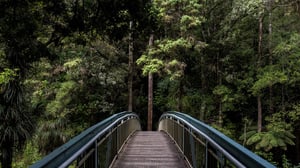The academic discipline of science can broaden our understanding of reality and directs our longing for Truth to God.
The Wonders of Creation
Over the past decade climate scientists have discovered that the Sahara Desert is responsible for sustaining life in the Amazon. Rich mineral deposits of phosphorus a nutrient for plants are found in abundance in the Bodélé Depression, Chad. These deposits form clouds of dust particles that travel across the Atlantic Ocean absorbing water off the ocean surface to transform into tropical weather systems. These systems dispense rainfall laiden with nutrients for plant life in the Amazon. According to researchers, there are sufficient phosphorus deposits in the Bodélé Depression to sustain life in the Amazon for a thousand years.
It is remarkable to consider that a barren desert in North Africa is responsible for sustaining life in the Amazon. This is just one example of how we have only scratched the surface of what is yet to be discovered. As human beings we are the only ones capable of rationally uncovering the mysteries of creation. This points to a deeper truth about ourselves that go beyond the study of the sciences. The human person suffers from loneliness, anxiety, sickness and depression. The human person longs for truth, justice, love and purpose. Such things provoke us to seek the Truth about our existence. We find these Truths in the one who created us - God.
Through the study of theology, scholastic philosophy, the Church Fathers (St. Augustine, St. Bonaventure, St. Charles Borromeo, St. Ignatius of Loyola and many others) and engaging with God in prayer, we discover the fullness of reality. In this endeavor we are shaped and molded into better human beings that long for something higher than just the ‘self’.
In Science, we may talk about the vastness of the universe or the beauty of earth, yet we fail to recognize that the purposeful activity we detect in Nature is not accidental – it originates from a highly intelligible and infinite being. Pope Francis at a recent meeting with young astronomers at the Vatican Observatory said:
“To know the universe, at least in part; to know what we know and what we don’t know, and how we can go about learning more; this is the task of the scientist. There is another way of seeing things, that of metaphysics, which acknowledges the First Cause of everything, hidden from tools of measurement. Then there is still another way of seeing things, through the eyes of faith, which accepts God’s self-disclosure. Harmonizing these different levels of knowledge leads us to understanding, and understanding – we hope – will make us open to wisdom.”
The Vocation of Science
Science exists to comprehend the nature of the created order but human beings experience a reality that distinguishes them from the rest of nature. For man longs for love, truth, justice and purpose. This totality of human life is a beautiful mystery that enriches the intellectual life and the sciences.
St. John Paul II once said:
“Every scientist, through personal study and research, completes himself and his own humanity. ... Scientific research constitutes for you, as it does for many, the way for the personal encounter with truth, and perhaps the privileged place for the encounter itself with God, the Creator of heaven and earth. Science shines forth in all its value as a good capable of motivating our existence, as a great experience of freedom for truth, as a fundamental work of service. Through research each scientist grows as a human being and helps others to do likewise.”
The vocation of science is the vocation for Truth. In this engagement with Truth and God we discover that we are made for much more. The vocation of science broadens our capacity to comprehend reality and to understand the purpose of our existence. This engagement enriches the life of the scientist and our culture. It is of no surprise that the Catholic Church has always been in the forefront of scientific discovery and continues to do so today.
Noteworthy Authors worth Reading: Romano Guardini, Antonin Sertillanges, Josef Pieper, Collected works of Aristotle translated by C.D.C Reeve, Pope Emeritus Benedict XVI, Saint Anselm and Saint Ambrose of Milan
